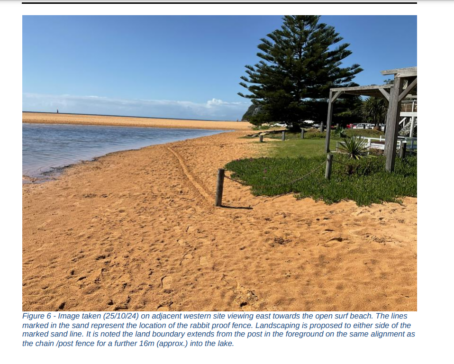A proposed rabbit proof fence on land the public uses to walk along the Southern edge of Avoca Lake has been rejected by the Local Planning Panel along with the new home proposed to be built behind it.
Council received a proposal to demolish the existing home at 1 Ficus Ave, Avoca Beach, and to replace it with a two storey home with seven bedrooms upstairs each ‘’serviced by an ensuite’’.
The planning panel rejected the proposal at its November 28 meeting.
The rabbit proof fence, while proposed to be built on the private property, was to be built on the sandy section of the property.

Council said that Avoca Lake during periods at full, or close to full, capacity flows across the rear portion of the land.
‘’It is estimated that approximately 250m2 of land area during these periods is submerged,’’ the report stated.
‘’The local community based on a unique historic circumstance utilise and walk along the southern edge of the lake, across private land parcels, connecting the nearby open space (Heazlett Park) with the surf beach,’’ the report stated.
The proposed landscape planting and a rabbit proof fence ‘’within the lake’’, was inconsistent with the relevant provisions for Coastal Use Areas, the report stated, and would result in changes to the existing access along the foreshore.
The report provided by council questioned the description of the home that is to be demolished.
The application said it was a six bedroom home while council said the 1987 approval was for a four bedroom home with only car parking and a laundry allowed on the ground floor to withstand effects of flooding.
The minutes show that the panel gave nine reasons for refusing the application.
These included concerns about the public interest and ”the combination of threats and hazards at this very exposed site, including potential sea level rise, flooding and storm surges, and noting the exposure of the site to a severe East Coast Low’’.
‘’Predicted flooding, storm surge and climate change impacts relative to an appropriate floor level are predictions that may warrant a precautionary approach in this instance,’’ the panel stated.


